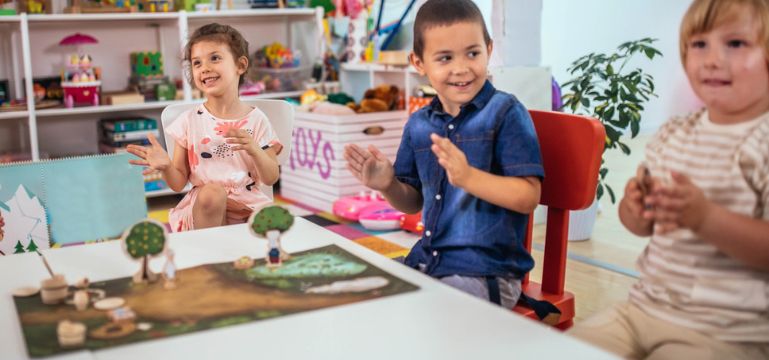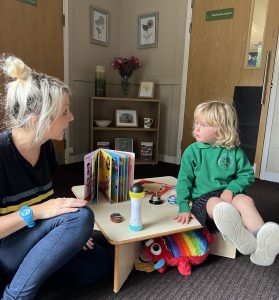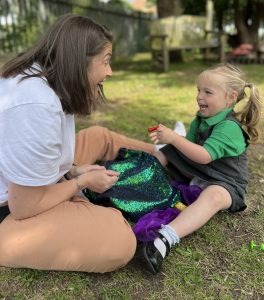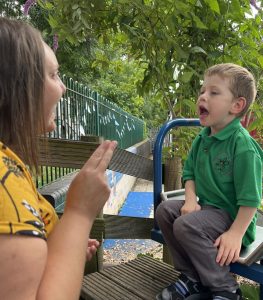Developing early communication skills with predominantly pre verbal pupils.

Quick links:
Information about the school
Ysgol Cae’r Gwenyn is a school for young children aged 3 to 5. Most children who attend the school have been referred by the Local Authority for further assessment within our resourced provision. The school caters for children across Wrexham County Borough. The Local Authority has identified 59 children as requiring a resourced placement.
Context and background to the effective or innovative practice
Nearly all children allocated a place at Ysgol Cae’r Gwenyn are preverbal. The school has introduced a range of strategies and initiatives to promote and develop each pupil’s engagement and communication skills. Staff create a language rich environment to help promote and build language skills. They strive to create a fun, nurturing and secure learning environment where children can take risks and feel safe to express themselves in a variety of ways.
Description of nature of strategy or activity
In Ysgol Cae’r Gwenyn, positive engagement and interaction with younger pupils is key to supporting their language development. Staff play with, and alongside the pupils offering commentary on their play, repeating sounds and words and modelling language. They follow the pupil’s lead ensuring that the interaction is fun. Practitioners know pupils well and are skilled in encouraging and challenging them. All practitioners are sensitive to the needs of pupils and modify their interactions depending on the individual needs.
Following close observations and assessments, practitioners identify pupils they feel would benefit from intensive and carefully planned intervention and support. These pupils are given opportunities to engage in 1-to-1 sessions with a trained practitioner in a quiet space with few distractions.
The use of carefully chosen resources and fun, challenging activities helps to support early years communication and language development.

Staff choose a variety of strategies to engage with pupils. They work collaboratively to plan and deliver bespoke and individualised programmes. This intervention often needs to be creative and tailored to the interests and learning needs of the child. Staff have high expectations of pupils and strive to ensure that they are challenged in relevant and appropriate ways.
Staff work closely with the Speech and Language service to support pupil’s language skills. Speech Therapists ensure that staff are trained in a variety of interventions that work on the early fundamentals of language. They work in partnership with parents to model language.

Throughout the session, practitioners use a variety of visual resources to aid communication and support understanding. Resources include Now and Next Boards, photographs of classroom areas on key fobs and visual timetables. All staff use Makaton signing as a visual way to aid communication.
Snack time is a very important part of each session. Food is a great incentive in encouraging the use of choosing boards, use of Makaton signing etc. Songs and rhymes are used throughout the session. They have a very positive impact on pupils’ language as well as providing a sense of fun and excitement. The school has a range of resources that are colourful, stimulating and appealing to children and which support listening skills and language development. These include puppets, colourful recording devices, pop up books, fairy lights and unusual musical instruments.

Practitioners keep their language short and simple and use interesting voices and appropriate facial expressions to support communication. Repetition helps language development and increases confidence. Staff follow the same daily format, sing the same songs, repeat the same instructions, directions etc, at key times of the day. On many occasions, it appears that pupils are not listening or paying any attention to what is going on around them but it is important not to make assumptions about whether a child is listening and absorbing the language. When the time is right, many pupils show they are paying attention but have chosen to share their voices, when they are ready.
What impact has this work had on provision and learners’ standards?
Detailed practitioner observations indicate that nearly all children make progress in their language development. The interventions implemented impact positively on pupils’ ability to communicate their needs and feelings. Practitioners’ knowledge and interest in supporting pupil’s language and communication skills, helps them meet their own professional development needs and is key to raising standards in the school.
How have you shared your good practice?
Ysgol Cae’r Gwenyn welcomes colleagues from local schools to observe their practice. Visitors have the opportunity to discuss their observations following their visit and to ask questions regarding language development. The school hosts drop-in sessions for staff from schools in the authority, where engaging language resources are displayed and ideas and strategies are shared. The school shares ideas for developing language skills with parents in review meetings and in staff led workshops.